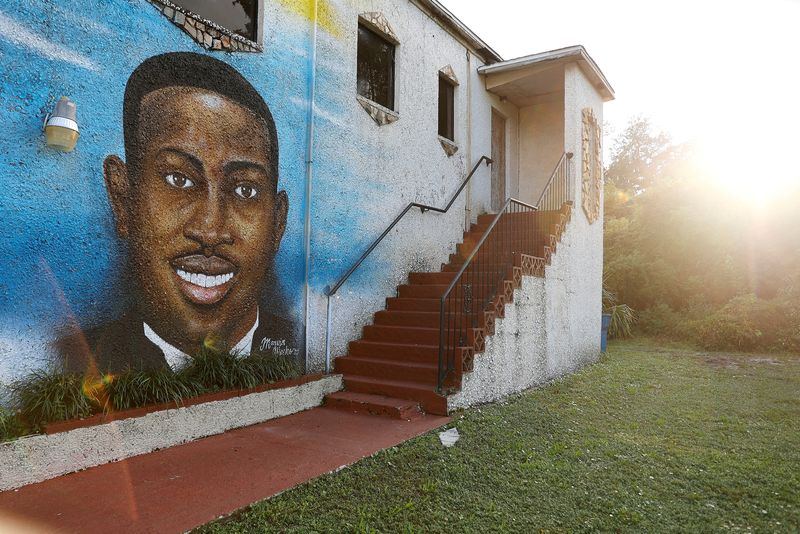By Rich McKay and Brad Brooks
BRUNSWICK, Ga. (Reuters) - The gunman convicted of murdering Ahmaud Arbery, a Black man in Georgia, repeatedly used racist language in text messages with friends, and also shared a music video of a white supremacist singer, jurors at his federal hate crimes trial heard on Wednesday.
Travis McMichael, who along with his father and neighbor are on trial, left a racist digital footprint stretching back to at least 2013 and, in the case of the neighbor, continued even after the murder of Arbery, 25, in 2020, FBI agent Amy Vaughan, tasked with processing the digital evidence in the case, told jurors.
Arbery's killing was one of several of Black men and women, often at the hands of police, that helped spark racial justice protests in recent years. The federal trial of Arbery's killers is the first in which those who carried out such a high-profile killing are facing a jury in a hate-crime trial.
McMichael, 36, claimed he shot Arbery in self-defense immediately after the incident, and local authorities made no arrests for 10 weeks, only doing so after a cellphone video of the killing made by Bryan emerged on social media, igniting widespread ire.
Jurors in the coastal town of Brunswick saw Facebook (NASDAQ:FB) posts that McMichael made lauding vigilantism, including one in which he said that he keeps his shotgun, which he used to murder Arbery, loaded with what he thought was a more powerful "high-brass" shell that would "rip somebody to shreds."
Vaughan said that messages from McMichael, his father Greg McMichael and their neighbor William "Roddie" Bryan were extracted from their cellphones and Facebook profiles. Numerous messages were shown and read aloud to jurors.
The FBI was not able to unlock Greg McMichael's iPhone -- the agency has often battled Apple Inc (NASDAQ:AAPL) over the encryption of its phones -- but Vaughan said the agency managed to retrieve some messages from his online phone backups.
Travis McMichael, Gregory McMichael, 66; and Bryan, 52, were convicted by a state court last year and sentenced to life in prison for chasing Arbery through the streets of their mostly white neighborhood and shooting him dead. Prosecutors in the new federal trial say Arbery was targeted because he was Black.
Defense attorneys for the three men said their clients were not motivated by Arbery's race, but rather by security fears after a series of break-ins in their Satilla Shores neighborhood. Prosecutors contend racial ill will was at the heart of the three men's actions when they pursued him while he was on a Sunday afternoon jog.
In one text message Travis McMichael sent to a friend, he discusses how happy he was to leave the Coast Guard and to be working as a government contractor, saying: "Love it, zero niggers work with me."
In another instance, McMichael sent a video via Facebook message to a friend. Attached to the message was a song titled "Alabama Nigger" by Johnny Rebel, a recording artist whose work explicitly supported white supremacy. The song played over a video of a Black child dancing.

In text messages sent to a friend, Bryan said he was upset that his daughter had started dating a Black man, and in one text message he used a racial epithet to refer to the man.
During the state trial last year, prosecutors did not focus on racial animus as a motivating factor in the crime. They only sought to prove the men were responsible for Arbery's death, regardless of motive.